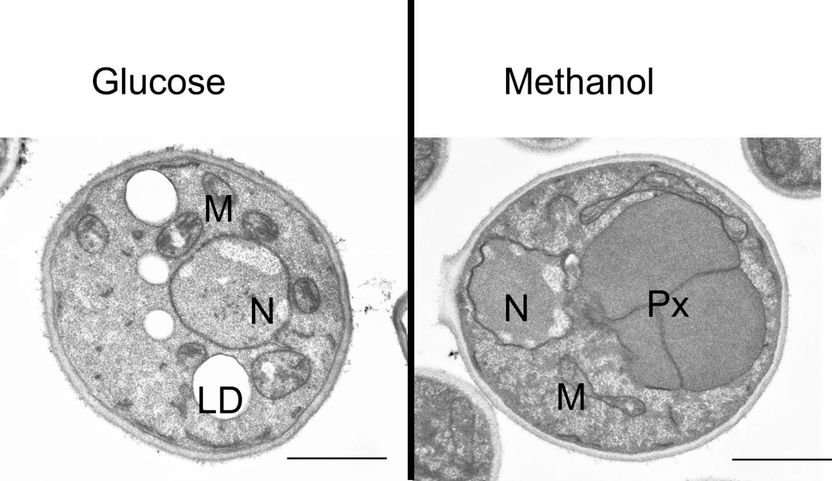Newly discovered metabolism certifies evolutionary advantage for yeast
Advertisement
Because of its long and varied use, yeast is one of the best studied organisms. Besides its industrial application Pichia pastoris is also used by scientists as a model organism for studying cell structures. Everything seemed familiar - until this year. Researchers of the Austrian Centre of Industrial biotechnology (acib) and the University of Natural Resources and Life Sciences Vienna (BOKU) have elucidated a new pathway that makes the yeast Pichia pastoris unique. "We were able to show that the assumptions and models that have been used in the last 30 years are not right", explains Prof. Diethard Mattanovich (BOKU and head of the research area "Systems Biology & Microbial Cell Engineering" at acib).

Electronmicroscopy of Pichia pastoris cells: normal yeast cells grown on glucose on the left. Clearly visible peroxisomes (Px), the organelles responsible for assimilation of methanol into cellular biomass on the right.
acib/Universität Graz
The new pathway explains the utilization of methanol as "feed". Yeasts such as Pichia pastoris belong to the rare kind of microorganisms that are able to utilize this simple alcohol as nutrient. Mattanovich: "The cells use that option, for example, when they grow naturally in the sap of trees, where methanol is present."
The researchers around project leader Dr. Brigitte Gasser discovered amazing similarities with plants. These use carbon dioxide (CO 2 ) as a nutrient and recycle the greenhouse gas in cell organelles called chloroplasts. Eventually CO 2 is converted to biomass. Pichia works similarly: It converts methanol, which consists of one carbon atom like CO 2 , in a cell organelle called peroxisome. The decisive role in both processes is the formation of chemical bonds between carbon atoms and the rearrangement into sugar molecules and other substances, which are necessary for the synthesis of biomass. "So far we did not know where these rearrangements are performed in the cells, and which genes control them", says Brigitte Gasser.
Just as little was known about the genetic encoding of this metabolism. Most cells have one gene available per protein and metabolic step. Pichia is evolutionarily on the safe side. All genes for methanol manipulation are duplicated, as Mattanovich and Gasser have discovered together with 13 scientists who were involved in this research project. The genes do not only have an additional genetic information so that the appropriate reactions are located to the peroxisome. They are active only when methanol is present as a nutrient source.
For these findings, the researchers have re-evaluated the entire data, which have emerged in the recent years while improving Pichia pastoris biotechnologically at acib and BOKU. "The interpretation of our systems biology data revolutionized the understanding of cell biology", says Brigitte Gasser, delighted about the new knowledge of life processes on earth. The work was recently published in the prestigious journal BMC Biology. The results demonstrate the leading role of Vienna researchers when it comes to the biotech yeast Pichia pastoris.



























































